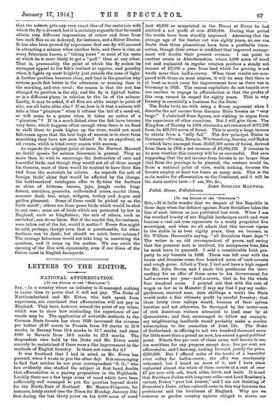LETTERS TO THE EDITOR.
NATIONAL AFFORESTATION.
I.To vas Earroa or Tea .'13racr■roa.1 SIR, —In a country where an industry is ill-managed nothing is easier than to prove that it will not pay. The Duke of Northumberland and Mr. Elwes, who both speak from experience, are convinced that afforestation will not pay in England. They have, however, missed the point of my letter, which was to show how misleading the experience of our woods may be. The application of scientific methods to the German State forests has since 1830 increased the revenue per hektar (2.47 acres) in Prussia from 39 marks to 2IB marks, in Saxony from 10.4 marks to 511 marks, and since 1860 in Bavaria from 14.6 marks to 32.3 marks. The despondent view held by the Duke and Mr. Elwes could scarcely be maintained if there were a like improvement in the methods of English forestry. Is there not room for it?
It was Scotland that I bad in mind, as Mr. Elwes has guessed, when I wrote to you the other day. His encouraging to find that neither he nor your correspondent "S. G.," who has evidently also studied the subject at first hand, doubts that afforestation is a paying proposition in the Highlands. Luckily there are a few large areas of wood which have been sufficiently well managed to put the question beyond doubt for the North-East of Scotland. Mr. Munro-Ferguson, for instance, lately stated (see the Times for Monday, January 5th) that during the last thirty years on his 4,000 acres of wood (not 40,000 as misprinted in the Times) at Novar he had realized a net profit of over £100,000. During that period the woods have been steadily improved. Assuming that the average age of the timber cut was eighty years, no one can doubt that these plantations have been a profitable trans- action, though their owner is confident that improved manage- ment will double their present revenue. I can point to another estate in Aberdeenshire, where 3,000 acres of wood cut and replanted in regular rotation produce a steady net income of £3,000 a year from land which for grazing is not worth more than half-a-crown. When these results are com- pared with those on most estates, it will be seen that there is at least as much room for improvement here as there was in Germany in 1830. The reason capitalists do not tumble over one another to engage in afforestation, is that the profits of this crop cannot be reaped for eighty years. That is why forestry is essentially a business for the State.
The Duke twits me with using a flimsy argument when I describe the net income from German State forests as "very large." I abstained from figures, not wishing to argue from the experience of other countries. But I will give them. The Kingdom of Saxony in 1904 obtained a net revenue of £.472,WO from its 429,300 acres of forest. This is surely a large income to obtain from a "silly fad." The five principal States in Germany—Prussia, Bavaria, Wurttemberg, Saxony, and Baden —which have amongst them 10,607,368 acres of forest, derived from them in 1905 a net revenue of £6,084,129. It remains to be seen whether this country will be as successful. Bnt even supposing that the net income from forests ie no larger than that from the grazing. to be planted, the venture would be, from a national point of view, worth making, because the forests employ at least ten times as many men. This is the main motive for afforestation on the Continent, and it will be the main motive here.—I am, Sir, &c., JOHN STIRLING MLXWELL. Polka House, Pollokshaws.










































 Previous page
Previous page